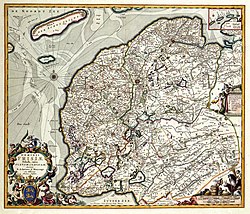Lordship of Frisia | |||||||||
|---|---|---|---|---|---|---|---|---|---|
| 1498–1795 | |||||||||
 Lordship of Frisia 1680, divided into quarters Westergo, Oostergo, Zevenwouden, Steden | |||||||||
| Status | State of the Holy Roman Empire (until 1648) part of the Habsburg Netherlands (1524–1581) part of the Dutch Republic (from 1581) | ||||||||
| Capital | Leeuwarden | ||||||||
| Common languages | Old Frisian, West Frisian, Dutch Low Saxon | ||||||||
| Religion | Catholic Church Protestantism | ||||||||
| Government | Feudal monarchy | ||||||||
| Historical era | Middle Ages | ||||||||
• Established | 1498 | ||||||||
• joins the Dutch Revolt | 1579 | ||||||||
• last count, Philip II deposed | 1581 | ||||||||
• Disestablished | 1795 | ||||||||
| |||||||||
The Lordship of Frisia or Lordship of Friesland (West Frisian: Hearlikheid Fryslân, Dutch: Heerlijkheid Friesland) was a feudal dominion in the Netherlands. It was formed in 1498 by King Maximilian I and reformed in 1524 when Emperor Charles V conquered Frisia.
